Senators Rockefeller, Harkin, Murray, and Manchin Introduce Legislation to Improve Working Conditions and Safety for Coal Miners
 2010 will long be remembered for the horrific disaster at Massey Energy’s Upper Big Branch mine, after an explosion killed 29 men and set off a firestorm in Appalachia and in Washington, D.C. over the safety of America’s coal miners. However, we must remember that there were an additional 42 mine fatalities that received less attention, but had just as tragic an impact on the friends, family, and community of all those involved. In all, these 71 US coal mining fatalities in 2010 were an enormous increase from recent years, and the challenge of moving that number to zero in the upcoming years looms large on the coal industry, federal regulators, and Appalachian politicians.
2010 will long be remembered for the horrific disaster at Massey Energy’s Upper Big Branch mine, after an explosion killed 29 men and set off a firestorm in Appalachia and in Washington, D.C. over the safety of America’s coal miners. However, we must remember that there were an additional 42 mine fatalities that received less attention, but had just as tragic an impact on the friends, family, and community of all those involved. In all, these 71 US coal mining fatalities in 2010 were an enormous increase from recent years, and the challenge of moving that number to zero in the upcoming years looms large on the coal industry, federal regulators, and Appalachian politicians.
Fortunately, Senators John Rockefeller (D-WV), Tom Harkin (D-IA), Patty Murray (D-WA), and Joe Manchin (D-WV) have introduced the Robert C. Byrd Mine and Workplace Safety and Health Act of 2011 (S 153). Their efforts deserve praise. Appalachian Voices strongly supports this bill, and urges Congress to pass it immediately. Coal mining is inherently dangerous, and our Appalachian workers deserve the safest mines that money can provide them.
The Senators who introduced this legislation understand that every miner deserves a safe place to work. Appalachian Voices urges them to remember that every Appalachian citizen also deserves a safe place to live. As long as the coal industry perpetuates the practice of mountaintop removal, Appalachian citizens are being denied their basic right of safety and well-being. Living near a mine shouldn’t mean that we must unnecessarily share the enormous dangers that are inherent in the coal mining process, and we would also ask Senator Rockefeller and Senator Manchin to support bipartisan legislation such as the Appalachia Restoration Act which would protect Appalachian citizens from toxic waste associated with mountaintop removal mines.
It is no accident that Massey Energy, who operated the Upper Big Branch Mine, was also the single largest perpetrator of mountaintop removal mining. They same corner-cutting mentality that led to the UBB disaster also leads to disastrously harmful practices like mountaintop removal. With reports emerging that Massey Energy is being bought by Alpha Natural Resources. United Mine Workers’ President Cecil Roberts had this to say:
…[E]rasing the Massey name from America’s coal industry is a positive step, no matter who is responsible for it. Massey had come to represent all that was wrong with the coal industry, whether it be safety and health issues, environmental issues or simple respect for its workers, their families and the communities where they live.
We agree completely, and urge Congress to strengthen our nation’s protection for our coal miners, as well as the surrounding community members who face the dangers of mountaintop removal.
Read More ...



 Many folks have asked what we thought of President Obama’s speech this evening. In particular,
Many folks have asked what we thought of President Obama’s speech this evening. In particular, 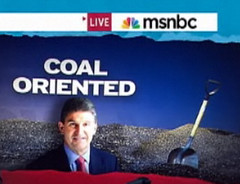 Substitute anchor Chris Hayes rightly points out that Joe Manchin has been making all the right mistakes to really earn his George Bush-like swagger. That much we expected. In fact, West Virginia resident Bob Kincaid told us:
Substitute anchor Chris Hayes rightly points out that Joe Manchin has been making all the right mistakes to really earn his George Bush-like swagger. That much we expected. In fact, West Virginia resident Bob Kincaid told us:
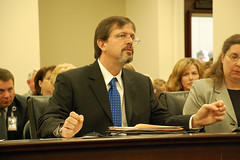 “Areas with especially heavy mining have the highest unemployment rates in the region; contrary to the common perception that mining contributes to overall employment.”
“Areas with especially heavy mining have the highest unemployment rates in the region; contrary to the common perception that mining contributes to overall employment.” The increased use of mountaintop removal mining means that fewer miners are needed to meet company production goals. Meanwhile the Central Appalachian coal seams that remain to be mined are becoming thinner and more costly to mine. Mountaintop removal mining, a declining national demand for energy, rising mining costs and erratic spot market prices all add up to fewer jobs in the coal fields.
The increased use of mountaintop removal mining means that fewer miners are needed to meet company production goals. Meanwhile the Central Appalachian coal seams that remain to be mined are becoming thinner and more costly to mine. Mountaintop removal mining, a declining national demand for energy, rising mining costs and erratic spot market prices all add up to fewer jobs in the coal fields. The state’s most productive coal seams likely will be exhausted in 20 years. And while coal will remain an important part of the economy, the state should emphasize green job development. That is especially important as pressure against mountaintop mining increases. Pressure is coming from both Republicans and Democrats. During the 2008 presidential race, Republican nominee John McCain came out in favor of ending mountaintop mining. It’s something that’s evolving over time in our industry and the responsible segment of our industry realizes that
The state’s most productive coal seams likely will be exhausted in 20 years. And while coal will remain an important part of the economy, the state should emphasize green job development. That is especially important as pressure against mountaintop mining increases. Pressure is coming from both Republicans and Democrats. During the 2008 presidential race, Republican nominee John McCain came out in favor of ending mountaintop mining. It’s something that’s evolving over time in our industry and the responsible segment of our industry realizes that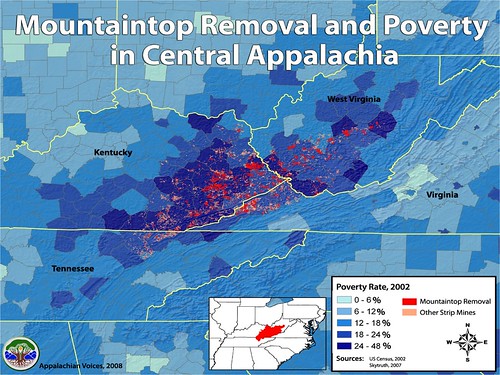
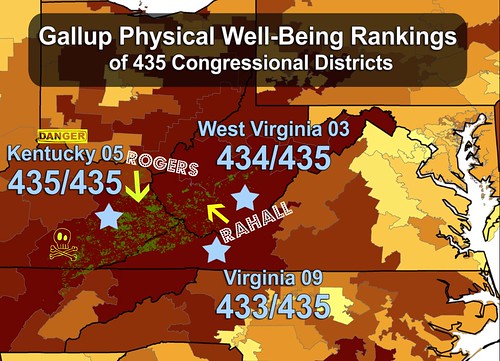
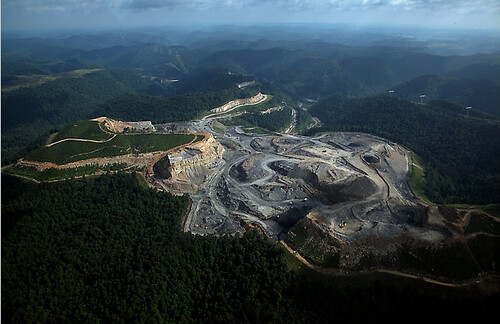 Which leads me to wonder…has anyone ever been so loud and proud about shoving their head in the sand and ignoring
Which leads me to wonder…has anyone ever been so loud and proud about shoving their head in the sand and ignoring  First of all, if you do your research (as Ken Ward does) you know that
First of all, if you do your research (as Ken Ward does) you know that

 A loyal friend, inspiring leader, and and a proud family woman, Judy will be remembered for her unwavering commitment to the people of Appalachia and for her heroic efforts to ending mountaintop removal coal mining. With her sharp wit and quick smile, Judy was a joyful peer, an engaging collaborator, and a powerful and beautiful storyteller who told the rest of America the story of the Appalachia and its people. Judy stood up and spoke up for herself and her region at great personal risk to herself, facing arrest, threats, and even assault from allies of a corrupt coal industry . Born in Marfok Hollow,WV a proud daughter of a coal miner, Judy, received international acclaim in 2003,
A loyal friend, inspiring leader, and and a proud family woman, Judy will be remembered for her unwavering commitment to the people of Appalachia and for her heroic efforts to ending mountaintop removal coal mining. With her sharp wit and quick smile, Judy was a joyful peer, an engaging collaborator, and a powerful and beautiful storyteller who told the rest of America the story of the Appalachia and its people. Judy stood up and spoke up for herself and her region at great personal risk to herself, facing arrest, threats, and even assault from allies of a corrupt coal industry . Born in Marfok Hollow,WV a proud daughter of a coal miner, Judy, received international acclaim in 2003,  Having run the
Having run the 